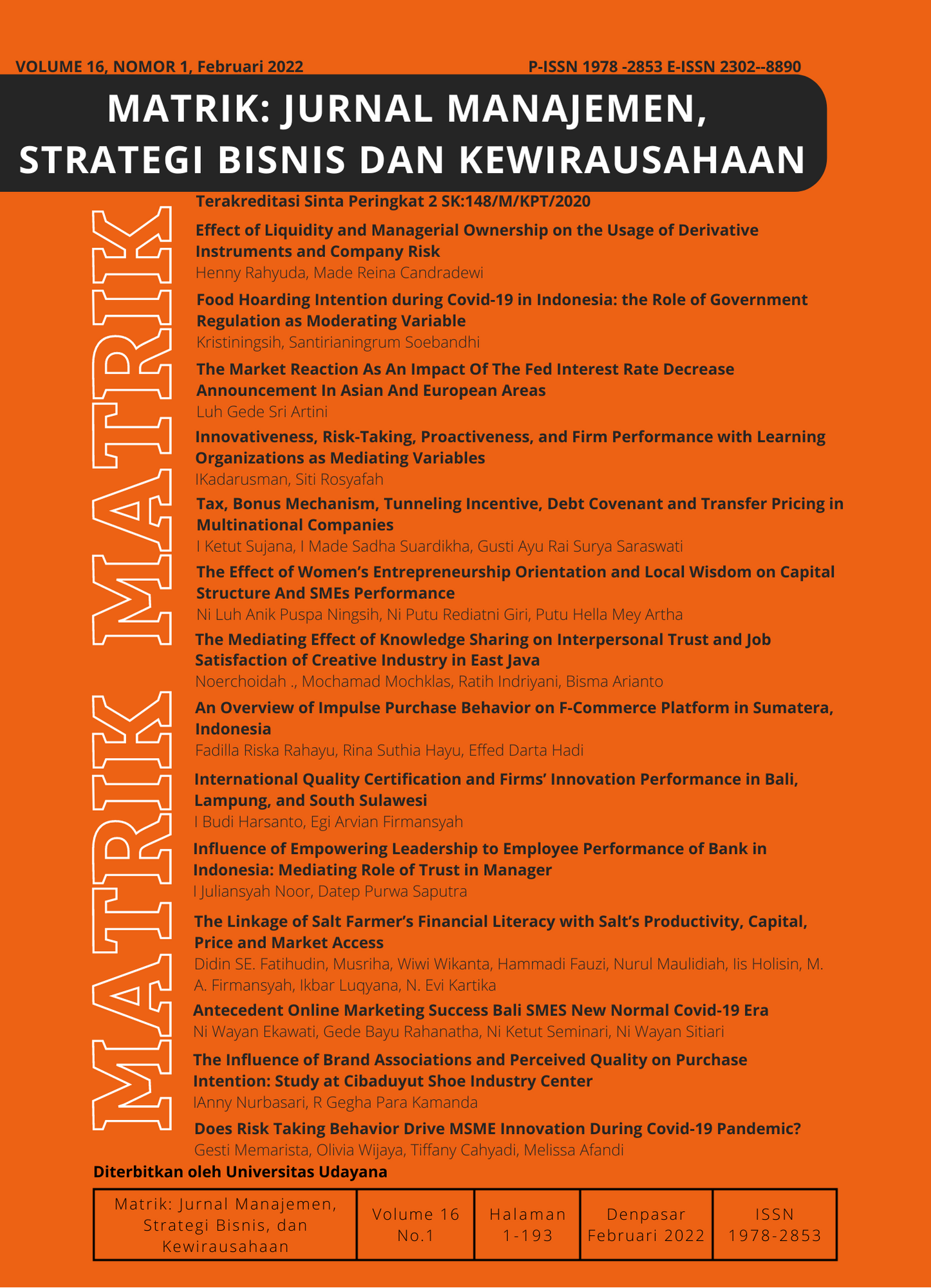Influence of Empowering Leadership to Employee Performance of Bank in Indonesia: Mediating Role of Trust in Manager
Abstract
This article purposes to investigate the role of trust in manager in influences empowering leadership to employee performance. Drawing on a sample of 217 bank employees in Indonesia, path analysis was employed to analyze data. Firstly, the finds of a path analysis expressed that the influence of empowering leadership has a positive on trust in manager and employee performance. Furthermore, the study examined the mediating influence of trust in manager between empowering leadership and employee performance. The study shows that empowering leadership is not useable to culture of Western only, but it also suitable in Indonesian culture. The study's limitations are the data have been collected from banking employees. This can cause common method bias. In the banking case, empowering leadership can increase employee performance through trust in manager. Training should be prepared for banks leaders with a particular train on simplifying the behaviors of empowering in them. The study on investigating the influence of empowering leadership on employee performance via trust in manager as a mediator variable is very limited.
Downloads
References
Allison, C. D. (2021). Linking Empowering Leadership and Employee Creativity: The Mediating Role of Affective-Based Trust in Leader. Eastern University.
Bartram, T., & Casimir, G. (2017). The relationship between leadership and follower in-role performance and satisfaction with the leader. Leadership & Organization Development Journal, 28(1), 4–19. https://doi.org/10.1108/01437730710718218
Bester, J., Stander, M. W., & Zyl, L. E. Van. (2015). Leadership empowering behaviour, psychological empowerment, organisational citizenship behaviours and turnover intention in a manufacturing division. Journal of Industrial Psychology, 41(1), 1–14. https://doi.org/10.4102/sajip.v41i1.1215
Chang, W., Liu, A., Wang, X., & Yi, B. (2020). Meta-analysis of outcomes of leader – member exchange in hospitality and tourism : what does the past say about the future ? International Journal of Contemporary Hospitality Management, 32(6), 2155–2173. https://doi.org/10.1108/IJCHM-06-2019-0591
Chow, I. H. S. (2018). The mechanism underlying the empowering leadership-creativity relationship. Leadership & Organization Development Journa, 39(2), 202–217. https://doi.org/10.1108/LODJ-03-2016-0060
Cropanzano, R., Dasborough, M. T., & Weiss, H. M. (2016). Affective Events and The Development of Leader-Member Exchange. Academy of Management Review, 47(2), 2–24. https://doi.org/doi.org/10.5465/amr.2014.0384
Cui, Y., & Yu, G. (2021). A cross-level examination of team-directed empowering leadership and subordinates’ innovative performance: an AMO theory perspective. International Journal of Manpower, 42(5), 621–636. https://doi.org/https://doi.org/10.1108/IJM-03-2020-0099
Govender, K. (2016). Empowering Leadership and Municipal Service Delivery : A Case Study of a Metropolitan Municipality in South Africa. International Journal of Public Administration, 40(5), 427–433. https://doi.org/10.1080/01900692.2015.1127964
Hair, F. H., Black, W. C., Babin, B. J., Anderson, R. E., Black, W. C., & Anderson, R. E. (2018). Multivariate Data Analysis (7th Editio). Hampshire, UK Cengage Learning. https://doi.org/10.1002/9781119409137.ch4
Hallikainen, H., & Laukkanen, T. (2018). National culture and consumer trust in e-commerce. International Journal of Information Management, 38(1), 97–106. https://doi.org/10.1016/j.ijinfomgt.2017.07.002
Hao, P., He, W., & Long, L. (2018). Why and When Empowering Leadership Has Different Effects on Employee Work Performance : The Pivotal Roles of Passion for Work and Role Breadth Self-Efficacy. Journal of Leadership &Organizational Studies, 25(1), 1–16. https://doi.org/10.1177/1548051817707517
Hassi, A. (2019). Empowering leadership and management innovation in the hospitality industry context. International Journal of Contemporary Hospitality Management, 31(4), 1785–1800. https://doi.org/10.1108/IJCHM-01-2018-0003
Hayes, A. F. (2018). Introduction to Mediation, Moderation, and Conditional Process Analysis: A Regression-Based Approach. New York: Guilford Publication.
Humborstad, I. W., Nerstad, C. G. L., & Dysvik, A. (2014). Empowering leadership, employee goal orientations and work performance A competing hypothesis approach. Personnel Review, 43(2), 246–271. https://doi.org/10.1108/PR-01-2012-0008
Islam, M. N., Furuoka, F., & Idris, A. (2020). The impact of trust in leadership on organizational transformation. Feature Article, 39(4), 25–34. https://doi.org/10.1002/joe.22001
Jada, U. R., Mukhopadhyay, S., & Titiyal, R. (2019). Empowering leadership and innovative work behavior : a moderated mediation examination. Journal of Knowledge Management, 23(5), 915–930. https://doi.org/10.1108/JKM-08-2018-0533
Jaiswal, N. K., & Dhar, R. L. (2017). The influence of servant leadership, trust in leader and thriving on employee creativity. Leadership & Organization Development Journal, 38(1), 2–21.
Kim, M., & Beehr, T. A. (2020). Job crafting mediates how empowering leadershipand employees’ core self-evaluations predictfavourable and unfavourable outcomes. European Journal of Work and Organizational Psychology, 29(1), 1–14. https://doi.org/10.1080/1359432X.2019.1697237
Kim, M., Beehr, T. A., & Prewett, M. S. (2018). Employee Responses to Empowering Leadership : A Meta-Analysis. Journal of Leadership & Organizational Studies, 25(3), 257–276. https://doi.org/10.1177/1548051817750538
Knezovic, E., & Musrati, M. A. (2018). Empowering Leadership , Psychological Empowerment and Employees ’ Creativity : A gender perspective. International Journal of Innovation, Creativity and Change, 4(2), 51–72.
Kundu, S. C., Kumar, S., & Gahlawat, N. (2019). Empowering leadership and job performance: mediating role of psychological empowerment. Management Research Review, 42(5), 605–624. https://doi.org/10.1108/MRR-04-2018-0183
Kwak, W. J., & Jackson, C. L. (2015). Organization : Relationship building in empowering leadership processes : A test of mediation and moderation. Journal of Management & Organization, 21(4), 369–387. https://doi.org/10.1017/jmo.2015.11
Lee, A., Willis, S., & Tian, A. W. (2017). Empowering leadership: A meta ‐ analytic examination of incremental contribution, mediation, and moderation. Journal of Organizational Behavior, 39(3), 306–325. https://doi.org/10.1002/job.2220
Lee, M. C. C., Idris, M. A., & Delfabbro, P. H. (2016). The Linkages Between Hierarchical Culture and Empowering Leadership and Their Effects on Employees ’ Work Engagement : Work Meaningfulness as a Mediator. Journal of Stress Management, 24(4), 392–415. https://doi.org/doi:10.1037/str0000043
Lee, S., Cheong, M., Kim, M., & Yun, S. (2016). Never Too Much ? The Curvilinear Relationship Between Empowering Leadership and Task Performance. Group & Organization Management, 42(1), 11–38. https://doi.org/10.1177/1059601116646474
Lin, M., Ling, Q., Luo, Z., & Wu, X. (2019). Why does empowering leadership occur and matter ? A multilevel study of Chinese hotels. Tourism Management Perspectives, 32(July), 100556. https://doi.org/10.1016/j.tmp.2019.100556
Muafi, Fachrunnisa, O., Siswanti, Y., Qadri, Z. M. El, & Harjito, D. A. (2019). Empowering Leadership and Individual Readiness to Change: the Role of People Dimension and Work Method. Journal of the Knowledge Economy Volume, 10, 1515–1535. https://doi.org/10.1007/s13132-019-00618-z
Roberts, J. A., & David, M. E. (2020). Personality and Individual Diff erences Boss phubbing, trust, job satisfaction and employee performance. Personality and Individual Differences, 155(October), 109–125. https://doi.org/10.1016/j.paid.2019.109702
Sakapas, S., Parinya, S., & Jermsittiparsert, K. (2019). Exploring the link between HR practices, employee motivation, employee empowerment and employee performance in engineering firms of Indonesia. International Journal of Psychosocial Rehabilitation, 23(4), 734–748. https://doi.org/doi.org/10.37200/ijpr/v23i4/pr190406
Scheidt, S., & Chung, Q. B. (2018). Making a case for speech analytics to improve customer service quality : Vision , implementation , and evaluation. International Journal of Information Management, 45, 223–232. https://doi.org/10.1016/j.ijinfomgt.2018.01.002
Sharma, P. N., & Kirkman, B. L. (2015). Leveraging Leaders : A Literature Review and Future Lines of Inquiry for Empowering Leadership Research. Group & Organization Management, 40(2), 193–237. https://doi.org/10.1177/1059601115574906
Tang, G., Chen, Y., Knippenberg, D. van, & Yu, B. (2020). Antecedents and consequences of empowering leadership : Leader power distance , leader perception of team capability , and team innovation. Journal of Organizational Behavior, 41, 551–566. https://doi.org/10.1002/job.2449
Tóth-király, I., Bőthe, B., & Orosz, G. (2017). Exploratory Structural Equation Modeling Analysis of the Self-Compassion Scale. Mindfulness, 8, 881–892. https://doi.org/10.1007/s12671-016-0662-1
Unterhitzenberger, C., & Bryde, D. J. (2019). Organizational Justice , Project Performance , and the Mediating Effects of Key Success Factors. Project Management Journal, 50(1), 57–70. https://doi.org/10.1177/8756972818808984
Wooi, C. T., Salleh, L. M., & Ismail, I. A. (2017). Lessons from the Major Leadership Theories in Comparison to the Competency Theory for Leadership Practice. Journal of Business AndSocial Reviewin Emerging Economies, 3(2), 147–156. https://doi.org/:https://doi.org/10.26710/jbsee.v3i2.86
Yang, J., & Mossholder, K. W. (2010). Examining the effects of trust in leaders : A bases-and-foci approach. The Leadership Quarterly, 21(1), 50–63. https://doi.org/10.1016/j.leaqua.2009.10.004
Yilmaz, G. (2014). Let’s Peel the Onion Together: An Application of Schein’s Model of Organizational Culture. Communication Teacher, 28(4), 224–228. https://doi.org/10.1080/17404622.2014.939674
 This work is licensed under a Creative Commons Attribution-ShareAlike 4.0 International License.
This work is licensed under a Creative Commons Attribution-ShareAlike 4.0 International License.

















